5 Reasons Why Living Abroad is Better
Than Visiting
Article and photos by Jonathon
Engels
7/19/2015
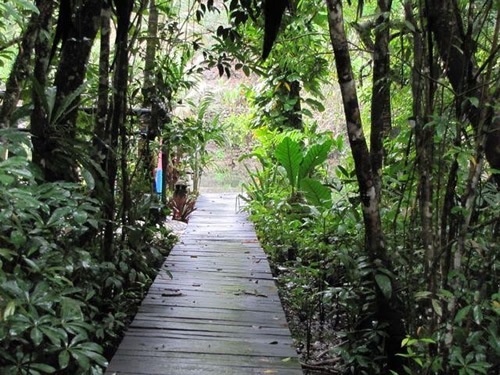 |
| An invitation too alluring to
miss. |
My wife and I arrived at our new apartment
in Moscow at around midnight, and by the next evening we
were officially evicted, with our bags abruptly repacked
for us and piled up at the door when we got home from work.
In the living room, our school-appointed liaison to Russia
was standing in tears as two thick-bodied people, later
identified as Mr. and Mrs. Landlords, cleaned the
place. She couldn’t really explain what was happening, but
she did manage to state the obvious: “We need to leave now.”
It’s moments like these, and there have
been many more over the years, in which I’ve questioned
our decision to live in such-and-such a country. Emma and
I have been robbed at gunpoint, picked up by Central American
border police, tear-gassed during May Day riots, and once
had to watch — keeping in mind we are vegan — as our Korean
colleagues delighted in killing an octopus tableside and
ingesting the legs as they continued to writhe. In Moscow,
we were evicted again about four months later when the new
Mr. and Mrs. Landlords sold the place we were renting
mid-lease.
The funny thing is that I’d never want
to live in Moscow again, but I could not imagine my life
being as fulfilled without having lived
in the country and having to overcome
such obstacles. I would likely lack the stories. I would
likely have a mortgage, car payments, and satellite TV package,
which, while they do have their purposes, are not the exactly
in the same class as starting a story with, "I was
at the hardware store but had no idea how to say plunger…"
1. The Marvelously Mundane
 |
| Crowds on the amazing Moscow
Metro. |
It sounds silly and maybe it is, but
looking for a plunger, such a mundane and even undesirable
task, is exactly the kind of thing that makes living somewhere
so much better than just visiting. It provides interesting
challenges. Such experiences push us — or at least Emma and
me — to the boundaries of our ability to function within a
new culture. From the daily unknowns, we learn how capable
we can be when necessity, e.g. a clogged toilet, calls for
a solution. In addition, there are little things — the daily
commute, the daily or weekly shopping, the basics of language — to
which we have learned to adapt that baffle visiting friends
and family.
As a result of these experiences, when
I travel now, I do so with much more confidence and calm.
I’ve stoically faced and mastered a dozen mysterious public
transport systems, even learned to appreciate the idiosyncrasies
of each. I’ve shopped on weekly basis in vegetable markets
from Moscow to Quito, sometimes with little more than the
use of charades and pointing to communicate what I need,
and always walked away well fed. While seriously long-term
traveling can provide some of this out-of-sorts swagger,
nothing compares to forging a full-fledged life abroad.
2. The Extraordinary Extras
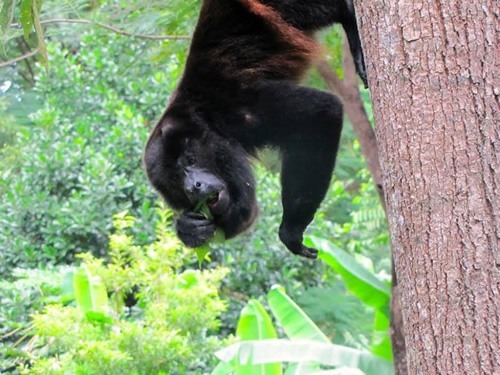 |
| View from the kitchen at home
in Nicaragua. |
On the complete opposite side of mundane
come the remarkable things that every place has to offer.
As tourists, we are tempted to blitz through the highlights,
checking off top ten lists and guidebook write-ups. As residents,
there is no rush, but more importantly, there is always
the option to revisit at our leisure when the mood strikes.
I traveled to the Rome for a few days, and have pictures
of me in the Vatican, at the Coliseum, and around the city.
I wandered the streets, developed specific and wonderful
memories, and would happily return. However, in the cities
in which I’ve lived, experiences become more uniquely mine.
In Istanbul, where I lived for 10 months,
I found a regular spot in Sultanahmet where I stopped for
lemonade and hookah every time I went, knew the schedule
at the Blue Mosque, and could aptly navigate the Grand Bazaar.
I lived a couple blocks away from Istiklal Cadessi, the
famous pedestrian street full of street performers, specialty
restaurants, and ancient architecture. I took the ferry
to Princes’ Islands about once or twice a month, with a
routine of getting a breakfast simit (kind of like
a sesame pretzel) on the way, and a cup of tea from the
vendors on the boat. Such familiarities, or personal rituals,
are specific to my own existence in such places that attract
millions of travelers every year.
3. The Beautiful People
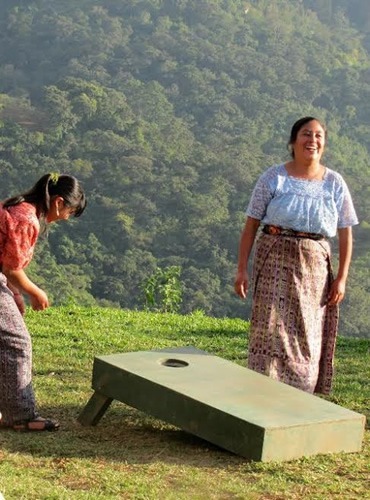 |
| Teaching "the Chicas" to play
cornhole at Earth Lodge in Guatemala. |
Interacting with the locals is generally
among most people’s top five reasons for traveling abroad,
satisfying that intrinsic curiosity about how life is over
there. As engaged travelers, we attempt a bit of the
local language, we go off-the-beaten-track in search of
real exposure to another culture. Many of us even engage
in short-term volunteering to learn more about what people’s
lives are really like (and how we might help). All of these
activities are important and wonderful, and a big part of
every trip I take. Sometimes I even develop friendships
that defy the brief time meeting and getting to know another
human being, yet somehow resonating and enduring as a real
connection.
Currently, though, I’m living in a rural
village in Guatemala for the third time. I have friends
here. I’ve attended weddings at the village church, at some
point taught nearly every child between the ages of eight
and eighteen, and can’t walk down the street without being
greeted by name. The people here are the indigenous Mayans.
The women still wear traditional trajes every day
and carry bundles of firewood on their heads. The children
can handle machetes better than a child-safe pair of scissors.
However much I may remain an outsider, an affectionately
regarded gringo, I am a recognized cog in the community
because they know I’m more than just another traveler passing
through. Such acceptance is incredibly special and difficult
to achieve without spending a serious length of time in
a location.
4. The Lure of a Local
 |
| Another round of backgammon at
our "Local" in Istanbul. |
My wife is British, and she always refers
to our regular pub, wherever we are, as our “local,” i.e.
the close-to-home spot where our faces are recognized (like
Norm at Cheers, for those familiar with the American
TV show). Granted, most of us travel abroad to broaden our
horizons, to get out of the rut of frequenting the same
places at home.
We want to see new things, taste exotic flavors, and find
something better than the same old stool. The truth, however,
is that traveling often leads us to hostel bars, sandy beach
cafes, or clubs filled with other travelers out to discover
the vibe of some popular city, while eating at tourist
restaurants that serve similar pizza, burgers,
omelets, sandwiches, and fried potatoes. After a while,
such places and activities abroad while traveling become
a blur—the same cleverly packaged getaway that
eventually feels like a cliché.
I’m not saying these places are somehow
unworthy of my patronage (many times our "local" is
a tourist haunt), but I am saying that the experience is
different when in a tropical lakeside town in Panama. The
staff, foreign and locals alike, know who you are. Conversations
are more apt to drift into things beyond where you’re from
and how many beers you will be drinking. Often, when living
abroad, the people at the "local," the smiling
woman at the market, the friendly cashier at the nearby
convenience store, become friends and their places feel something
more like home. The four walls of
a "local," or the many regular places we grow
to love, the menu or product selections, become highly personal
rather than general impressions of a location.
5. The Festivals and Foods
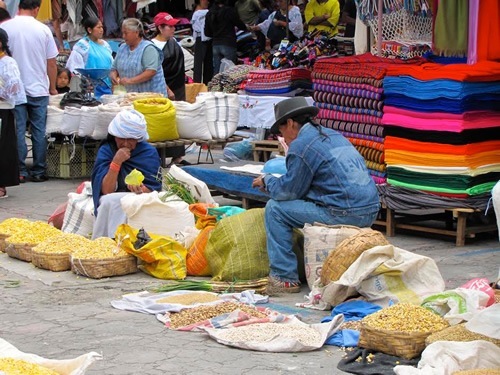 |
| Tuesday’s Otavalo Market in the
eastern part of Ecuador. |
Nearly every country has a customary celebration for New Year's, and many have adopted Christmas in some form or fashion, be it secular or religious. Typically every country
celebrates some sort of Independence Day, except for England,
from whom so many colonies won their independence, as my
wife points out... There are traditional dishes we’ve tried
back home: falafel, fish and chips, Thai curry,
Indian curry, borscht, kimchi, pupusas, and tapas.
As a tourist, all of these holidays, if timed correctly,
can be experienced, and all of the accompanying food specialties
are available to enjoy. Yet as a resident, the festivals
are endless and enlightening, progressively explaining more
about the people around us, the way they celebrate, and
the importance of moments that are often sacred rituals
to the locals.
In Korea, in 2005, Emma and I became
an official item after a Christmas Eve celebration. At that
same celebration, I learned that Koreans of a similar age
as us, the 20s in that decade, partied away Christmas but
really celebrated New Year’s—a long-running tradition—much
more solemnly with their families. On New Year's, Koreans
receive gifts from their grandparents and eat a special
soup called ttoekguk, with sliced rice cakes, while
turning one year older upon the meal’s completion. Another
unique element of the celebration in the culture, as my
wife loves to tell, is that all Koreans are one when they
are born and turn one year older on New Year’s Day—so
theoretically, if a Korean were born on December 31st, he
or she is two years older the next day.
The point is that foods, festivals,
and foods at festivals are often the most intimate and even
sacred connections an outsider can have with a location,
and the longer the residency the more profound the sense
of place.
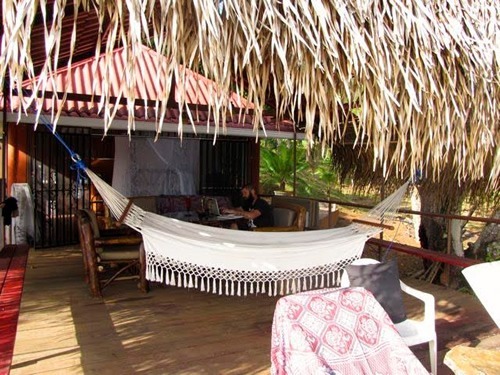 |
| Writing at our lakeside work-trade
home in Panama. |
As with any look at a culture or way
of living, it’s easy to scarcely scratch the surface. Traveling,
by its fleeting nature, only reveals a tiny fraction of
the nature of a place, just as this article, with its word
limit, can only express a fraction of what a life abroad
really means and involves. Hell, living somewhere for a
year honestly only reveals a fraction more, but it’s in
these incremental fractions that we can find a world in
which we all share lives with surprising similarities and
defining differences. I am all for travel if traveling is
what you can and want to do. I say live abroad if the time
is right. Only our innermost selves and external circumstances
can determine which option is best, and only we personally
can make the most appropriate decisions.
What I can say without hesitation is
that living abroad is an experience that has forever changed
and continues to change me, one so intoxicating that I’ve
have not moved back “home” since leaving
over 10 years ago, now a place so distant from my reality
that it feels like I’m tourist every time I return. Ironically,
I’ve appreciated and seen the U.S. more as a visitor than
I ever did as a resident, and I’m much more aware of
who I am as a person based upon the simple fact of where
I was born and raised. It has both distanced me from and
connected me with my past, my history, and my country. It
has done more for me, as a person, than seemed realistic
when I embarked on my odyssey.
A life abroad is not something to take
lightly; rather it is a path from which more things become
possible, the planet bigger than boundaries, people greater
than national heritage, and existence more than predictable.
 |
Jonathon
Engels earned an MFA in creative writing.
He has lived, worked and/or volunteered in seven
different countries, traveling his way through
nearly 40 countries between them. His many interests include permaculture, veganism, and ways to live sustainably.
|
|
